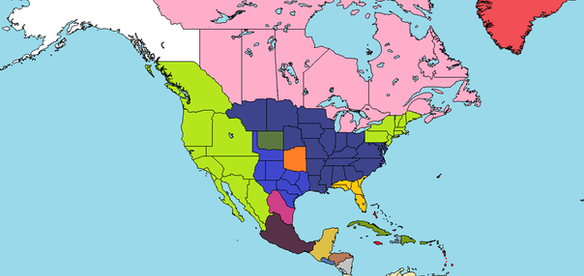HOME | DD
 machinekng — Revolution Comes Early - (1774 A.D.)
machinekng — Revolution Comes Early - (1774 A.D.)

#alternatehistory #map #americanrevolution #colonization
Published: 2017-02-26 21:11:07 +0000 UTC; Views: 4833; Favourites: 77; Downloads: 25
Redirect to original
Description
The defeat of parliament's rebellion in 1645 may have saved Britain from Republicanism, but it granted no such respite to the New World. Many of the parliament's partisans, as well as Calvinists angered by the Anglican church's increasing resemblance to the Catholic faith, fled to the New World, forming theological and political societies and bidding their time. That time came in 1704, during the reign of Queen Anne. Anne, like her father James II, was a Catholic and like her predecessors came into conflict with the still-Anglican parliament. When parliament had the tenacity to refuse new taxes, something that they had not risked doing under the reigns of Charles II or James II, Anne ordered that Parliament be dissolved. This act lead to the Second English Civil War in Britain, and the American Revolutions in the New World. While the revolutions started in the English colonies, they spread to the New Netherlands and the French colonies. While the French were able to hold onto Canada and Southern Louisiana, and the British were able to keep a toehold in Arcadia, Northern Louisiana, the English colonies and the New Netherlands all successfully seceded by 1709. To defend their newfound liberty, the four new republics entered into a covenant. With the Iroquois joining in 1712, the Conjoined Republics were born.However, liberty is a word that means many things to many people. For the New English, who had long lusted to establish a Calvinist society, liberty meant the dominance of the Congregationalist churches, suppression of Catholics, and the establishment of centralized, corporatist states. For the New French, it meant adopting the ideals of Voltaire and the Philosophes, forming an enlightened republic of free men. This was not a situation that could last. The Conjoined Republics could not agree to cohesive policies. There were disputes over settlement of the frontier, the treatment of native people, tax policies, and most importantly, religious liberty. Ultimately, the situation came to a head when Benjamin Franklin's radical Fire Brigadiers staged a coup in New England in 1753, declaring independence from the Conjoined Republics. Virginia's more moderate government followed shortly after, fearing a similar attempt by their own Fire Brigadiers. While the remaining Conjoined Republics attempted to limp along, their governments also gave up on the project, officially dissolving the covenant in 1757.
Now, in 1774, chaos threatens to rear its head. The victory of the pro-religious liberty All-Christian Party for a Republic of Splendor in Virginia surprised many, and the brutal crackdown by Virginia's Protector, George Mason, shocked even more. This event is compounded by violence in the Quadrant. While the Quadrant is a nominally French territory, it has been claimed by all bordering states, and is full of independent settlers and natives. Violence between Catholic and Calvinist settlers is another conflict that could lead to war between the former Conjoined Republics. Finally, the European powers have made peace in the Germanies, and have turned their attention westward once more. The French and Spanish seek to reassert their claims, and the British feel that weakening the New English could help prevent a Third English Civil War.
Related content
Comments: 2

...huh. That actually doesn't seem that bad. So the First Nations are given equal placement in the Republics? How did that one come about?
👍: 0 ⏩: 0


























